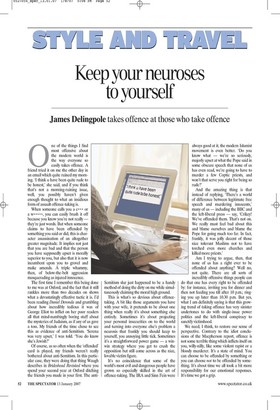Keep your neuroses to yourself
James Delingpole takes offence at those who take offence ne of the things I find most offensive about the modern world is the way everyone so easily takes offence. A friend tried it on me the other day in an email which quite ruined my morning. 'I think u have been quite rude to be honest,' she said, and if you think that's not a morning-ruining issue, well, you possibly haven't given enough thought to what an insidious form of assault offence-taking is.
When someone calls you a c*** or a w*****, you can easily brush it off because you know you're not really — they're just words. But when someone claims to have been offended by something you said or did, this is character assassination of an altogether greater magnitude. It implies not just that you are bad and that the person you have supposedly upset is morally superior to you, but also that it is now incumbent upon you to grovel and make amends. A triple whammy, then, of below-the-belt aggression masquerading as injured innocence.
The first time I remember this being done to me was at Oxford, and the fact that it still rankles more than two decades on shows what a devastatingly effective tactic it is. I'd been reading Daniel Deronda and grumbling about how incredibly tedious it was of George Eliot to inflict on her poor readers all that mind-numbingly boring stuff about the mysteries of Judaism, as if any of us gave a toss. My friends of the time chose to see this as evidence of anti-Semitism. 'Serena was very upset,' I was told. 'You do know she's Jewish?'
Of course, as so often when the 'offended' card is played, my friends weren't really bothered about anti-Semitism. In this particular case, they were doing that thing Waugh describes in Brideshead Revisited where you spend your second year at Oxford ditching the friends you made in your first. The antiSemitism slur just happened to be a handy method of doing the dirty on me while simultaneously claiming the moral high ground.
This is what's so devious about offencetaking. A bit like those arguments you have with your wife, it pretends to be about one thing when really it's about something else entirely. Sometimes it's about projecting your personal insecurities on to the world and turning into everyone else's problem a neurosis that frankly you should keep to yourself, you annoying little tick. Sometimes it's a straightforward power game — a winwin strategy where you get to crush the opposition but still come across as the nice, lovable victim figure.
It's no coincidence that some of the world's most evil and dangerous people have grown so especially skilled in the art of offence-taking. The IRA and Sinn Fein were always good at it; the modern Islamist movement is even better. 'Do you know what — we're so seriously, majorly upset at what the Pope said in some obscure speech that none of us has even read, we're going to have to murder a few Coptic priests, and won't that serve you right for being so rude?'
And the amazing thing is that instead of replying, 'There's a world of difference between legitimate free speech and murdering innocents,' many of us — including the BBC and the left-liberal press — say, `Crikey! We've offended them. That's not on. We really must feel bad about this and blame ourselves and blame the Pope for going much too far. In fact, frankly, it was jolly decent of those nice tolerant Muslims not to have torched even more churches and killed more priests.'
Am I trying to argue, then, that none of us has a right ever to be offended about anything? Well no, not quite. There are all sorts of incredibly offensive things people can do that one has every right to be offended by: for instance, inviting you for dinner and then not feeding you till after 10 p.m.; ringing you up later than 10.30 p.m. But yes, what I am definitely saying is that this growing trend of taking offence has very sinister undertones to do with single-issue power politics and the left-liberal conspiracy to sanctify victimhood.
We need, I think, to restore our sense of perspective. Contrary to the idiot conclusions of the Macpherson report, offence is not some terrible thing which inflicts itself on you, willy-nilly, like some violent rapist or a bloody murderer. It's a state of mind. You can choose to be offended by something or you can choose not to be offended by something. It's about time we all took a bit more responsibility for our emotional responses. It's time we got a grip.






















































 Previous page
Previous page